“Nowadays when I get home and take a shower in the evening, I feel very blessed as long as there’s hot water coming out,” Carrie Lam Cheng Yuet-ngor once said.
Born to a low-income family and raised in a “tong lau” subdivided flat, a typical accommodation in Hong Kong’s overcrowded tenement buildings, the 59-year-old was elected the fifth-term chief executive of the Special Administrative Region (SAR) of China on Sunday.
The first female leader of the SAR will face challenges bigger than those she overcame to change her own destiny.
Resounding win
Lam received 777 valid votes from 1,194 members of the election committee in the first round of voting, surpassing the 601-vote threshold for victory, results announced by the Electoral Affairs Commission of Hong Kong showed.
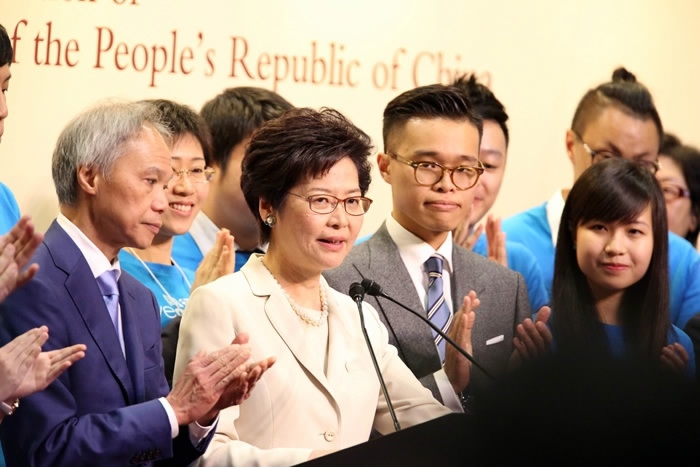
Carrie Lam (C) and her campaign team attend a press conference after winning the chief executive election in Hong Kong, China on March 26, 2017. /CFP Photo
The former chief secretary easily eclipsed her two opponents – former financial secretary John Tsang Chun-wah who gathered 365 votes and retired judge Woo Kwok-hing who got 21 votes. Lam’s votes were more than twice those of her two rivals combined.
“The work of uniting our society to move forward begins now,” Lam said in her acceptance speech, pledging to lead Hong Kong forward in solidarity.
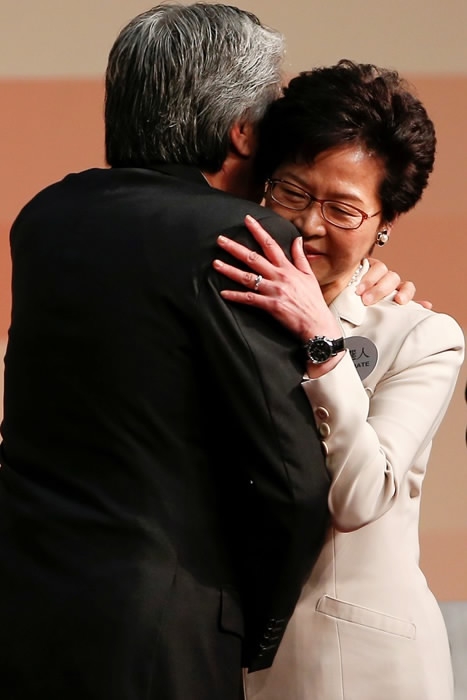
John Tsang (L) congratulates Carrie Lam after she won the election for Hong Kong's chief executive in Hong Kong, China on March 26, 2017. /CFP Photo
Lam said she is ready to begin a new chapter in the journey together with the Hong Kong people, adding that she will discuss with people from various sectors the development of the SAR, such as applying new resources in education, tackling housing problems and introducing new financial and tax measures.
She also stressed that she will do her utmost to uphold the "one country, two systems" principle and guard Hong Kong's core values.
High expectations
Lam received congratulations from the central government, her opponent and the current chief executive.
The head of the Liaison Office of the Central People's Government in the Hong Kong SAR extended congratulatory wishes to Lam on her victory. The official expressed hope that Lam will lead the SAR government by uniting all sectors of society, implement the principle of "one country, two systems" and the Basic Law fully and accurately, concentrate efforts on developing the economy and improving people's quality of life, promote social stability and harmony and strive to open up new prospects.
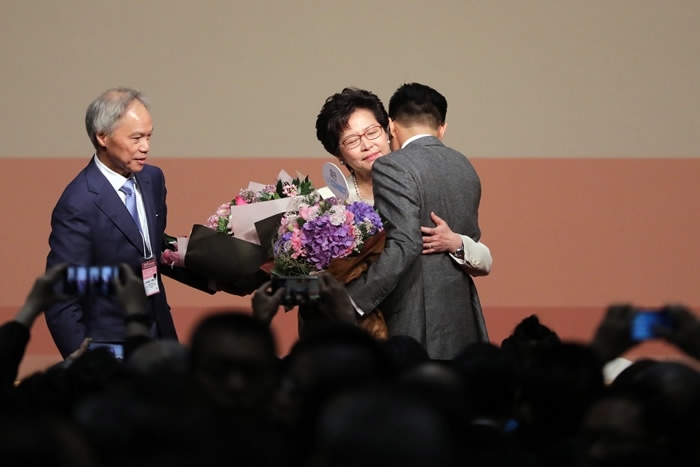
Carrie Lam (C), Hong Kong's chief executive-elect, hugs her son Lam Jit-si (R) as her husband Lam Siu-por (L) looks on following the results announcement of the chief executive election in Hong Kong, China on March 26, 2017. /CFP Photo
Meanwhile, a spokesperson for the Hong Kong and Macao Affairs Office of the State Council said the election embodied the principle of openness, fair play and justice and that the newly elected chief executive meets the established standards.
The central government will perform the appointment procedures according to law, the spokesperson said.
Tsang, Lam’s major competitor in the election, offered his “heartfelt congratulations” and wished her “every success” as the next chief executive.
“I wish to call upon all of you to lend her your full support, so that she and her government will be able to bring about a more harmonious future for a better Hong Kong,” Tsang said at a press conference on Sunday afternoon.
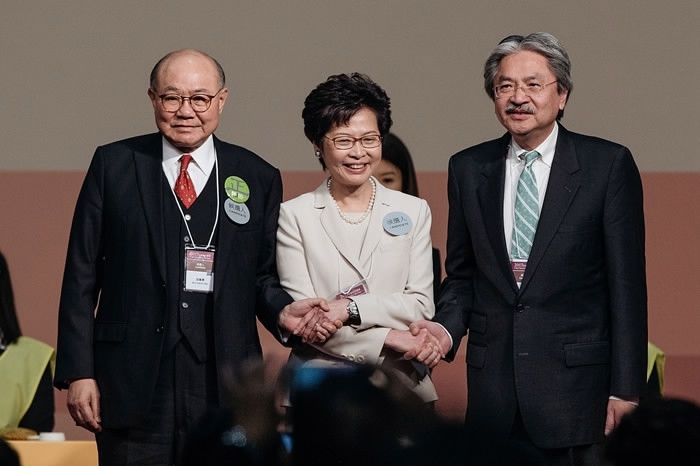
Carrie Lam (C), Hong Kong's chief executive-elect, stands on stage with candidates John Tsang (R), Hong Kong's former financial secretary and Woo Kwok-hing (L), a retired judge, after the announcement of the chief executive election in Hong Kong, China on March 26, 2017. /CFP Photo
Incumbent Hong Kong Chief Executive Leung Chun-ying, who will be succeeded by Lam on July 1, also presented his “sincere congratulations” to the former number two figure in his administration.
The next top leader of Hong Kong shoulders high expectations from the public. “We hope Carrie Lam will lead Hong Kong towards prosperity and stability and create more opportunities for exchanges between citizens in Hong Kong and mainland China,” a Hong Kong resident told CCTV.
“She is a very capable person with a strong sense of responsibilities,” another resident said, expressing confidence that Lam can heal the rifts in society.
Chen Jingwei, chairman and president of the Hong Kong China Chamber of Commerce, hailed Lam as the most popular choice and expected her to honor her campaign promises to cut taxes for small and medium-sized enterprises and improve people’s livelihood. “She is capable of handling complicated economic and social situations,” he said.
Chen called the position of the chief executive “a bridge and link” between the central government and the Hong Kong SAR and between “one country” and “two systems.”
‘Tough fighter’
Born in May 1957, Lam was the fourth child of a poor couple in Hong Kong. Growing up in a “tong lau” subdivided flat, she had no access to flush toilets and adequate light and had to do her homework on a bunk bed.
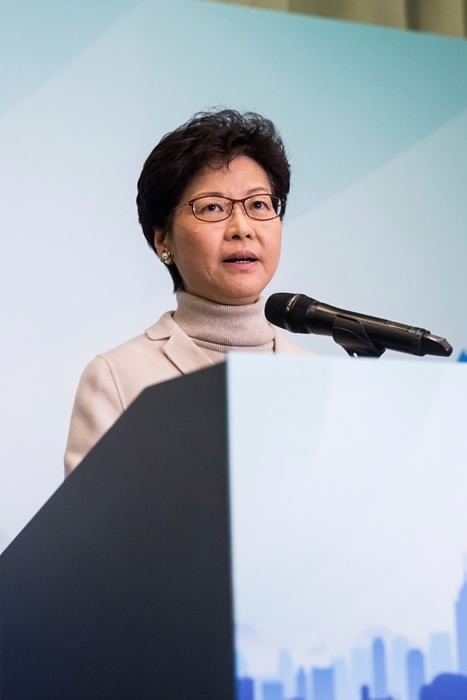
Carrie Lam speaks at a press conference to announce her candidacy for the 2017 Hong Kong chief executive election in Hong Kong, China on January 16, 2017. /CFP Photo
Despite humble beginnings, she was admitted to the University of Hong Kong, majoring in social work. She later switched to sociology and graduated in 1980 -- the year she started serving in the government.
During her nearly 37-year career as a civil servant, Lam served in various bureaus and departments. She became the director of the Social Welfare Department in 2000, the permanent secretary for Housing, Planning and Lands in 2003, the permanent secretary for Home Affairs in 2006 and the secretary for Development in 2007.
As the secretary for Development, she earned the reputation of a “tough fighter” – a skillful and resolute problem solver – from her handling of the demolition of the Queen’s Pier.
With a support rate of 73.8 percent, she entered Leung’s administration in 2012 as the most popular official.
In the next five years, the veteran fighter will need to solve tougher problems amid efforts to revitalize Hong Kong’s economy and reunite its divided society.
1970km










